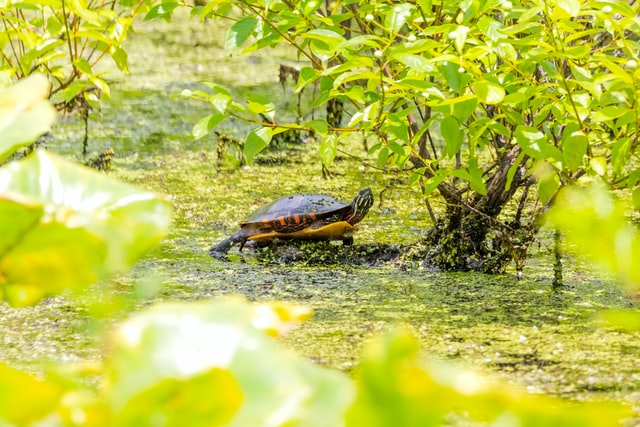2 March 2022

Underwater noise can cause hearing loss in turtles, according to new findings to be presented at the Ocean Sciences Meeting. It’s the first time hearing loss from acoustic pollution has been documented in turtles. Credit: Mathew Schwartz/Unsplash
AGU press contact:
Liza Lester, +1 (202) 777-7494, [email protected] (UTC-5 hours)
Contact information for the researchers:
Andria Salas, Woods Hole Oceanographic Institution, [email protected] (UTC-5 hours)
WASHINGTON—Underwater noise pollution can cause turtles to experience hearing loss that can last from minutes to days, say researchers who will present preliminary evidence of the effects of intense noise on turtles on 4 March at the 2022 Ocean Sciences Meeting, being held online from 24 Feb through 4 March.
Activities like shipping and construction create a lot of noise in both fresh and saltwater environments. Previous studies have focused on the effects of noise in a range of animals, from squids to fishes to whales. But less work has been done on reptiles, like turtles, said Andria Salas, a researcher at Woods Hole Oceanographic Institution who will present the findings.
“Our preliminary findings are the first to support that these animals are vulnerable to underwater hearing loss after exposure to intense noise,” Salas said. “We have assumed that turtles experience hearing loss when exposed to sufficiently intense sounds as observed in other animals, but there hasn’t been any data collected specifically on turtles.”
Salas and her colleagues were surprised by the relatively low level of noise that impacts the turtles’ hearing, which is essential for communication and avoiding predators. The new findings could have implications for the conservation of some threatened turtle species.
“If this occurs in nature, turtles would be less able to detect sounds in their environment on these timescales, including sounds used for communication or warning them of approaching predators,” she said. “Over half of turtle and tortoise species are threatened, and noise pollution is an additional stressor to consider as we work towards protecting these animals.”
Salas and her colleagues focused their experiments on two non-threatened species of freshwater turtles. They used a minimally invasive electrode, inserted just under the skin above a turtle’s ear, to detect very small electrical voltages created by the turtles’ auditory system when they hear sounds. Before exposing the turtles to loud (high amplitude) white noise, the researchers first determined the lower threshold of turtles’ underwater hearing and which tones (frequencies) they heard best.
After exposing the turtles to noise and then removing them from the noise, the researchers kept measuring turtle hearing for about an hour to see how they recovered their underwater hearing in the short term, and then checked two days later to see if recovery was complete. While the turtles always recovered their hearing, hearing loss could last for about 20 minutes to over an hour. However, sometimes hearing had not recovered by the end of the testing hour, indicating they needed more time to fully recover from the noise exposure. The hearing of one turtle was affected for multiple days.
###
AGU (www.agu.org) supports 130,000 enthusiasts to experts worldwide in Earth and space sciences. Through broad and inclusive partnerships, we advance discovery and solution science that accelerate knowledge and create solutions that are ethical, unbiased and respectful of communities and their values. Our programs include serving as a scholarly publisher, convening virtual and in-person events and providing career support. We live our values in everything we do, such as our net zero energy renovated building in Washington, D.C. and our Ethics and Equity Center, which fosters a diverse and inclusive geoscience community to ensure responsible conduct.
Notes for Journalists
Andria Salas will be available for interviews during the meeting. Please contact her via email: [email protected]
Session information: ME09 Exploring and Characterizing Deep and Coastal Ocean Soundscapes 03, Friday, 4 March, 12:30-1:30 pm ET.
Presentation abstract: Consequences of the anthropogenic soundscape: underwater noise-induced hearing loss in aquatic turtles
For information about Ocean Sciences Meetings 2022, including the schedule of press events, visit the Ocean Sciences Meeting 2022 Media Center.
Neither the presentation nor this press release is under embargo.